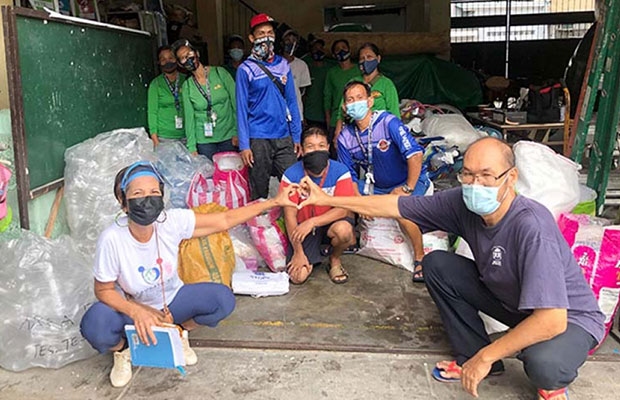
Saving a Precious Resource … and Providing for the Future
In the Philippines, where hundreds of thousands of residents depend upon the “blue economy” to improve their job prospects, livelihoods and contributions to a sustainable ecosystem, Salesian missionaries are leading an innovative new program to save one of our planet’s most precious resources.
The blue economy is defined by the many opportunities that the ocean and its coastline can provide: fishing, tourism, transportation, renewable energy and so much more. At the same time, the double-edged sword of consumer plastics increasingly threatens these opportunities.
“Many of the world’s low- and middle-income families rely on inexpensive packaging, generally made of plastic, to deliver everything from food and clean water to clothing and other goods,” explains Father Gus Baek, director of Salesian Missions. “Unfortunately, as we have begun to understand, the true costs of single-use plastics are measured in its devastating effects on the environment.”
That’s why, when the opportunity arose for Father Antonio “Beng-Beng” Molavin to collaborate with Plastic Bank, he acted immediately.
Fr. Beng-Beng is rector of the Salesian St. Ildefonso Parish in Makati, a suburb of Manila. Plastic Bank is a non-governmental organization focused on removing plastics from the environment. Recently, the Ecological Ministry of the Archdiocese of Manila chose St. Ildefonso to lead the creation of locally based efforts to manage plastics—and model their implementation so that other parishes and their members may follow.
“If we take the problem of plastic pollution seriously and try to offer an effective solution, we will solve a great ecological problem,” says Fr. Beng-Beng.
This issue is close to his heart. Nearly 20 percent of Filipinos—or 22 million people—currently live in poverty and struggle to survive on meager wages. At the same time, close to 60 percent of the country’s population lives on, or very close to, the coastline. If more people participate in the opportunities provided by the blue economy, Fr. Beng-Beng knows, more families can lift themselves out of poverty. Taking steps to ensure that this economy remains healthy and available is therefore important to more inclusive growth and development. Since nearly 2 million people live in Manila alone, the city’s residents can truly lead that charge.
This is where Plastic Bank comes in. Rather than try to eliminate plastics altogether, the company focuses on recycling them—an approach that has significant potential in the Philippines. Here, consumer activity generates a massive 2.7 million tons of plastic waste each year—and an estimated 20 percent of that ends up in the ocean. As the World Bank reports, this situation has an alarming negative impact on the country’s fishing, shipping and tourism sectors.
At the same time, the plastics industry itself contributes more than $2 billion to the country’s economy. In its recent report Market Study for Philippines: Plastics Circularity Opportunities and Barriers (March 2021), the World Bank suggests that the circular economy—or “reduce, re-use and recycle”—is a win-win both for a vital national industry, and for the ocean upon which many Filipinos depend.
“Our Salesian missionaries are truly at the vanguard of this effort,” says Fr. Gus. “And, while their efforts may seem modest given the enormity of the challenge, we must remember that successful journeys start with small steps.”
At St. Ildefonso, parishioners are taking charge of their legacy and their future. “We brought the project first to our local community, which has adopted the recovery of plastic as their main project during the pandemic,” says Fr. Beng-Beng. “After learning about this subject matter, we started going house to house educating families on ways to reuse and recycle plastic in an effort to eliminate harmful waste.”
During the next five years, Fr. Beng-Beng hopes to create a network of 500 families who will work together to amplify this initial project … as well as identify additional opportunities to address the issue of plastics and their effects on the ocean.
If the ocean stays healthy and flourishes, so do the poor communities that rely on it for food and job opportunities.
Our mission empowers people to help protect the earth’s precious resources which, in turn, provide sustenance. What’s your mission?
Learn more about our work in the Philippines.

